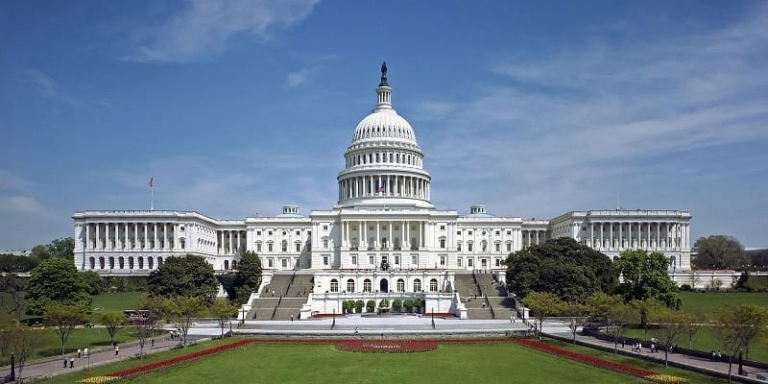
I. Congress
1) Legislation
Afghan and Iraqi Allies Resettlement Improvement Act. Twenty-seven House Democrats introduced H.R. 5096 to improve the process through which Afghan and Iraqi individuals who helped the United States in its operations in their countries can be resettled in the United States. Among other things, the bill would mandate that the departments of Defense and State establish temporary programs to employ Iraqi special immigrants as translators or cultural awareness instructors.
2) Personnel and Correspondence
Progressives Criticize Palestinian Authority for Ongoing Crackdown. Over the last week, prominent supporters of Palestinian rights on Capitol Hill turned their ire on the Palestinian Authority (PA) because it continues to crack down on political activists and dissidents. The most visible case was that of Nizar Banat, an outspoken critic of the PA and President Mahmoud Abbas; Banat died in PA custody in June. Palestinians have protested the PA for Banat’s death and its West Bank crackdown more broadly, prompting the body to escalate its arrests and heavy-handed response.
Prominent progressives like Reps. Ilhan Omar (D-Minnesota), Rashida Tlaib (D-Michigan), Cori Bush (D-Missouri), and Mark Pocan (D-Wisconsin) all spoke out against the PA recently, calling for an end to its human rights abuses. Their criticism—as some point out—was borne from their overall disillusionment with the PA, an organization some argue largely exists to ensure Israel’s security and effectively perpetuate the occupation. It is notable that this group’s commitment to Palestinian rights is consistent and rights-based, unlike many in Washington who reflexively support the Israeli government despite its poor human rights record. Rather, this group of progressives will also criticize Palestinian elites who violate the rights of Palestinians in the occupied territories.
Reps. Tlaib and Dingell Call for TPS for Lebanese. Al Jazeera reported that Reps. Rasihda Tlaib and Debbie Dingell (D-Michigan) are trying to garner support for extending Temporary Protected Status (TPS) to Lebanese citizens currently living in the United States. TPS allows members of a designated group to legally live and work in the United States; it has been used to protect members of the Somali, Syrian, Sudanese, and Yemeni communities in recent years. Tlaib and Dingell argue that due to the economic and political crises facing Lebanon, it is unsafe for Lebanese nationals to return to the country.
II. Executive Branch
1) White House
President Biden, Top Administration Officials Host Israeli PM Bennett. Israeli Prime Minister Naftali Bennett made his first visit to the United States and, as expected, he had face time with President Joe Biden at the White House in addition to meetings with top administration officials. While the pair postponed their planned August 26 meeting as a result of the explosion at the Kabul airport, the two did share a call that same day and Bennett was then welcomed to the White House on August 27.
Bennett also secured meetings with Secretary of State Antony Blinken and Secretary of Defense Lloyd Austin III. It was also reported that Bennett would hold meetings or phone calls with other government officials like National Security Advisor Jake Sullivan, Speaker of the House Nancy Pelosi (D-California), House Majority Leader Steny Hoyer (D-Maryland), and Senate Minority Leader Mitch McConnell (R-Kentucky).
During his visit, Bennett looked to shore up US-Israeli relations and bill himself as a pragmatic partner who would not ruffle feathers in Washington, like former Prime Minister Benjamin Netanyahu. In addition, Bennett’s trip was also part of his effort to lobby the United States against rejoining the Joint Comprehensive Plan of Action (JCPOA) with Iran.
Biden Administration Reaches Out to Gulf Arab States after Afghanistan Evacuations. The Biden Administration is facing criticism for its approach to the planned withdrawal of US forces from Afghanistan and the speed with which the Taliban took control of Kabul. In the chaotic evacuation process, Gulf Arab states have played an important role in ensuring that US citizens and those Afghans who aided the US mission could leave safely. As such, President Biden, Secretary Blinken, and Secretary Austin all spoke with top Gulf officials to thank them for their assistance.
President Biden spoke with Qatari Emir Tamim bin Hamad Al Thani and Abu Dhabi, United Arab Emirates, Crown Prince—and de facto ruler—Mohammed bin Zayed. Secretary Austin spoke with his Bahraini, Kuwaiti, Qatari, and Turkish counterparts, while Secretary Blinken spoke with the foreign ministers of Qatar (see here and here), Bahrain, and Turkey (see here and here). Though not related to the events in Afghanistan, Deputy Secretary of State Wendy Sherman met with her Omani counterpart, Sheikh Khalifa Al Harthy, to discuss bilateral relations and the broader themes of peace and security in the Middle East.
NSA Sullivan, Secretary Blinken Speak with Iraqi Officials. NSA Jake Sullivan and Secretary Blinken each communicated with top Iraqi government officials last week to discuss evolving US-Iraq relations. Sullivan spoke with Foreign Minister Fuad Hussein and Blinken was on a call with President Barham Salih.
2) Department of State
Secretary Blinken Announces Shipment of COVID-19 Vaccines to Palestine. Secretary Blinken tweeted that the United States provided 500,000 doses of the Moderna COVID-19 vaccine to Palestine. While this is undoubtedly good news, it in no way obscures the fact that, as Arab Center Washington DC Non-resident Fellow Yara M. Asi has written, Israel has an obligation to vaccinate the Palestinians living under its military occupation and it has repeatedly failed to do so.
Special Envoy Malley Uncertain about Future of JCPOA. US Special Envoy for Iran Robert Malley said in a recent round of interviews that the fate of the JCPOA is still very uncertain. According to Malley, there are serious concerns among his colleagues that Tehran is no longer interested in negotiating a return to the nuclear accord. In response, Malley reiterated his position that the United States is committed to a compliance-for-compliance return to the agreement and that Washington would even consider “difficult compromises” to secure Tehran’s return.

